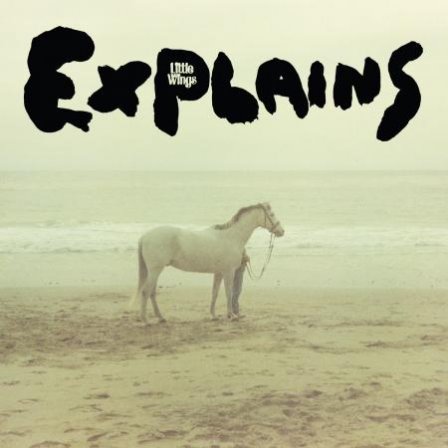“Common sense is not a single unique conception, identical in time and space. It is the ‘folklore’ of philosophy, and, like folklore, it takes countless different forms. Its most fundamental characteristic is that it is a conception which, even in the brain of one individual, is fragmentary, incoherent and inconsequential, in conformity with the social and cultural position of those masses whose philosophy it is.”
– Antonio Gramsci
Writing in the early 1930s1, Gramsci couldn’t have possibly anticipated the industry in folk music that was to arise after the Second World War. Nonetheless, his words prove uncannily prophetic when it comes to Explains. Little Wings’ newest album, its lyrics don’t so much explain human existence as reproduce its disjointed chaos in a flurry of poetic one-liners. Its montages of proverbs, references, and maxims corroborate Gramsci’s definition of folklore as a “fragmentary” pell-mell of beliefs, and even if there are moments of wisdom to be found in its breezy dolor and offhand gravity, these moments never coalesce into a systematic worldview.
Contrary to what Gramsci might have concluded though, this lyrical discontinuity is one of Explains’s greatest strengths. From the rheumy-eyed strains of “By Now” to the hopeful asides of “Where,” Kyle Field’s scattered, stream-of-consciousness delivery engenders a vivid sense of the profusion and complexity of his Californian environment. Despite the absence of a unifying theme or motif, these primarily acoustic songs breathe with a plethora of everyday detail that obscures their often nonexistent innards. They suck the listener in and convince her to remain within their bustling confines, partly because their lack of a single overarching message grants this same listener enough space and autonomy to cherry-pick her own conclusions.
But a track like the aching “Little Brangs,” for example, isn’t simply a procession of trivia and shout-outs that can be adapted to suit your illusions. Its doleful piano, hangdog voicings and unsolicited product-placement also furnish an interesting window into how the hyper-plural makeup of common sense, knowledge, and culture often serves to bar people from coherence. Rather than offering constructive insights, it bombards us with such consumption-obsessed quatrains as “Swoops just like the Nike hats/ Three stripes like Adidas/ Dunkin’ like those donuts/ And we know you want to eat us.” Not only are these lines tunefully sung and intoxicatingly gloomy, but they underline how the modern-day focus on consumerist minutiae actually alienates us from the world we inhabit.
It’s almost as if Field realizes this, since much of his singing appears to lament the decentered, disorganized and transient nature of his life and his thought. In the plaintive “Hill Hidden Nog,” he bemoans the “Ever-changing surfaces,” the “Multi-colored rainbow,” and how “The day is gone before we know.” During the tranquilized drifting of “Old Apocalypse Style,” he pines after “The simple mind I wish I had,” regrets how “I can’t show my face/ ‘Cause it’s a face that never shows,” and finally drops the confession that, “But with no where to run to/ Confused as where to go.” It’s precisely this loss of direction and self in the empty fragments of today’s society that lends Explains its deeper layers of poignancy, intimating as it does on “Hollow Log” that Field, “Sleeping inside a hollow log/ Wild and raw and tameless,” couldn’t possibly reform this society for the better, because it has already stripped him of the self-knowledge needed to know where exactly he wants to take it.
Yet to Field’s credit, Explains isn’t content to wallow in the doldrums and namedrop the likes of Ray-Ban for long. The pastoral “A Blade of Grass” finds him using Whitmanesque imagery to invoke a kernel of our working-class selves that’s never quite eroded by the bourgeois 21st century and its morass of bagatelles. Later, the keening “A Sky” has him and his slide guitar vowing to return from the insubstantial “sky” to rejoin with an old flame on more solid ground.
Even better, the album ends on a higher note with its two strongest cuts: “This Evening” and “Where.” With the former track, drizzly synths enter the mix to offer serene respite from the confused mania of the album’s day, while the falsettos of the latter fire our imaginations with a youthful suspicion of possibility. Together, they counteract the deluge of over-familiar phrases and adages that had characterized the record until then, impressing us with the conviction that we can succeed in escaping such clichés and in “Making a home away from home.” Field goes some way to achieving this aim with the blissful culmination of Explains, which if nothing else will enter the annals as a surprisingly enjoyable warning against the “common sense,” “folklore,” and “popular culture” that in discordance all threaten to separate us from the bigger picture.
1. “Critical Notes on an Attempt at Popular Sociology,” in Selections from the Prison Notebooks, Hoare, Q. and Nowell-Smith, G. (Eds), London, 2007, p. 419.
More about: Kyle Field, Little Wings




